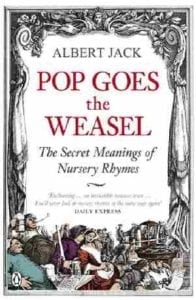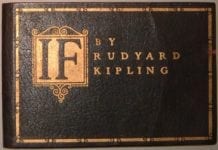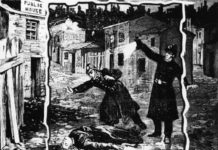
Ring-a-Roses
Ring-a-ring o’ roses,
A pocketful of posies;
A-tishoo! A-tishoo!
We all fall down.
This rhyme usually accompanies a dancing game that ends with all the children falling to the ground, getting their clothes muddy and going home to a clout round the ear. Or at least that’s how I remember it.
‘Ring-a-Ring o’ Roses’ is traditionally associated with the plague – the Great Plague of London in 1665 or the Black Death of the late 1340s – and it is easy to see why. A plague victim would show early symptoms of the disease in the form of red, circular rashes all over the body resembling wreaths of roses (Ring-a-ring o’ roses).
The rhyme also seems to reflect the superstition that if a person was to carry around a pouch, or ‘pocket’, stuffed with herbs or ‘posies’, there was less chance of infection (A pocketful of posies).
Sneezing would be also be a symptom (A-tishoo! A-tishoo!), indicating that the person was in an advanced state of infection, certain to fall down (dead) very shortly afterwards. So far so neat.
Unfortunately this doesn’t actually accord with the known symptoms of the disease. Between two and six days following infection, the illness becomes obvious in a person. The early signs are headaches, chills, high fever. No rosy rings. Following the fever would come the formation of buboes, an inflammatory swelling of the lymph glands in both the groin and armpits.
There is no historical record that posies, herbs or any other flower were used as preventive medicine, although there is evidence that sweet-smelling flowers were sometimes carried to counter the terrible odours in areas affected by disease.
People were so terrified of catching the plague, in fact, that they are known to have resorted to extreme measures – burning all their clothes, possessions and sometimes even their houses in the hope of avoiding infection.
And finally, there is no reference anywhere to sneezing as a final and fatal symptom of the plague.
One of the strongest arguments given for the rhyme being connected with the plague is, in fact, one of the strongest arguments against it. Several historians have urged in favour of the association. But the big question is this: if indeed the rhyme dates as far back as the Black Death in the 1340s, then why did nobody write it down for over five hundred years?
No contemporary record of the rhyme has been found from that period. Even Samuel Pepys (1633–1703), the noted diarist and chronicler of a later outbreak, the Great Plague, makes no mention of it, although it seems unlikely that no record should be made until 1881, centuries after it was – seemingly – first sung.
In fact, no connection had been made between ‘Ring-a-Ring o’ Roses’ and either of the plagues until 1961, when James Leasor proposed the idea in his book The Plague and the Fire.
In conclusion, while the connection between rhyme and plague makes a good story, it appears far more likely that ‘Ring-a-Ring o’ Roses’ is a simple children’s party game, illustrating nothing more than a group holding hands in a circle and dancing around, to the accompaniment of satisfying sounds effects (A-tishoo! A-tishoo!) and actions (We all fall down).
In its first publication in Britain, in 1881 – in Kate Greenaway’s Mother Goose – the sneezing wasn’t even part of the rhyme, perhaps suggesting a later addition:
Ring-a-ring-a-roses,
A pocket full of posies;
Hush! hush! hush! hush!
We’re all tumbled down.
The version in Alice Gomme’s Dictionary of British Folklore (1898) reads:
Ring a ring of roses,
A pocket full of posies;
Upstairs, downstairs,
In my lady’s chamber.
While, as late as 1949, a version included in a collection of verse entitled Poems of Early Childhood – illustrated with four happy children dancing in a circle and carrying bunches of roses – still carries no reference to the fatal sneezing:
Ring a ring a rosy,
A pocket full of posies;
One, two, three, four,
We all fall down.
Albert Jack AUDIOBOOKS available for download here

Pop Goes the Weasel – Nursery Rhyme History




































